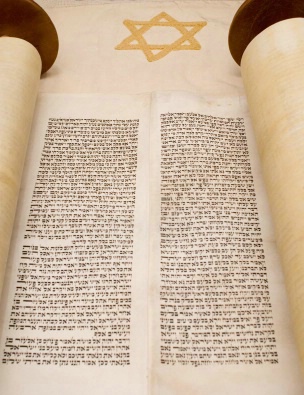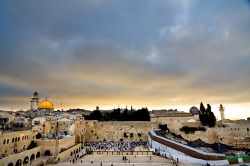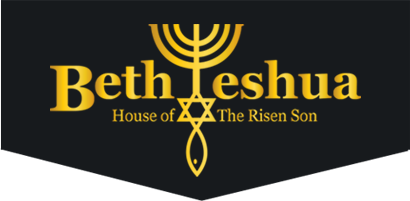Beliefs
.jpeg)
Why Does Beth Yeshua Exist?
Beth Yeshua exists to proclaim the Basorah (Good News, Isaiah 61:1) of the forgiveness of sins, and the gift of eternal life, both of which come through faith in the God of Israel and his Son, the Messiah Yeshua (Jesus). The salvation (rescue from eternal death) is from God for all mankind (Isaiah 49:6). Messianic synagogues enable people to embrace biblical faith in the Jewish Messiah without forsaking their Jewish heritage.
Why Such Jewish Emphasis?
As a Messianiccommunity, we are called to minister biblical truth to both Jewish people and the nations who have a love for Israel and the Messiah, Yeshua. Our Messiah was a Jewish rabbi, we worship as He did using many of the same prayers and customs. Our doors are always open to all visitors. Our focus is on our love for God and our neighbors. Our goal is to bring out the best in everyone, not to look at their past mistakes, but to help them discover God's plan for their lives so they can "grow and bear much fruit for Him."
Pillars of Faith
1. Yeshua and the Father are central to all we say and do. Our focus needs to be on them--not on us.
2. All of the Word of God from Genesis through Revelation is our guidepost.
3. We are a Set-Apart Community of Believers--like minded in belief, purpose, and action.
4. We operate in the Gifts of the Spirit for the benefit of the Kingdom.
5. We seek unity within the congregation and also within the wider body of believers.
6. We desire to teach "Jewish Roots" to the wider body of Messiah.
7. We believe in the irrevocable calling of the Jewish people as witnessed by the rebirth of Israel. We celebrate God's appointed feasts including the Shabbat. We affirm Jewish culture and practices that do not contradict the Word of God such as Brit Milah (Circumcision), Bar & Bat Mitzvah, Pidyon Ha Ben (Redemption of the first born ceremony), Purim, Simchat Torah, and Chanukkah.
8. We are called to share the "besorah" (Good News) as we go--as a matter of life practice.
9. We believe in a Biblical World View that constantly asks: Does this line up with the Word of God and the Character of God.
10. We believe that Praise and Prayer are fundamental in establishing a "face to face" relationship with God.
11. We believe in accountability as a Biblically based practice.
12.We believe in tithing as a Biblically based practice to support the congregation.
The following tenets of faith encourage intimate fellowship with the God of Israel and recognize the ongoing covenantal relationship with that God. The tenets view the B'rit Chadashah (New Covenant) as having been given as "Torah" and they apply equal weight to all Scripture. We believe there is one overriding covenant - that of grace through faith. It is consistent from Genesis to Revelation.
Through the triple blessing of the people, Torah, and the land, God has sanctified Israel--set her apart from other nations and made her the "Apple of His eye." The Gospel or "Good News" is about the coming reign of the God of Israel over all the earth. Through this New Covenant, Jewish and non-Jewish believers have equal access to God.
Section 1: God
The God of Israel is the one true living God existing eternally as: Father (Abba), Son (Ben), and Holy Spirit (Ruach HaKodesh). Each possesses the qualities and attributes of deity, yet are one. God is identified as the God of Abraham, Isaac, and Jacob, the Holy One of Israel. That He is a Spirit, infinite, eternal, unchangeable in His love, mercy, power, wisdom and righteousness (Isaiah 45:22, 40:25-26; John 4:24; 2 Cor 13:14).
Section 2: Man
Man was created in the image of God. Through Adam's sin, man became alienated from God and became condemned to eternal punishment. Man was created to glorify God. Through Abraham, God chose to elect and redeem a people--Israel--and through this people He chose to bring forth the Messiah who would redeem all mankind so that man could once again glorify God and have fellowship with Him (Gen 12; Isa 53; Gen 1:27, 3:16-19).
Section 3: Yeshua
Yeshua is the Son of God. He became flesh as the promised Messiah of Israel. He was conceived by the Ruach HaKodesh (Spirit of God) and was born of the Jewish virgin Miriam (Mary). He is both fully God and fully man. Yeshua the Messiah died as a substitutionary sacrifice for man's sin and all who believe in Him are declared righteous on the basis of His shed blood. One's redemption by Messiah's substitution was foreshadowed in the Tanakh with the slaying of the Passover lamb, the Sin and Trespass offering, and the Sin Offering on Yom Kippur, the Day of Atonement. Yeshua lived a sinless life, arose from the dead bodily and ascended into heaven, is seated on the right hand of God, the Father, and will return to establish His Kingdom. Salvation by God's grace comes through faith alone (Matt 1:18-25; John 1:14; Col 1:15-18; 1 Pet. 2:24; Luke 24; Heb 4:14; Matt 25:31-46).
Section 4: The Ruach HaKodesh (Holy Spirit)
The Ruach HaKodesh (Holy Spirit) is active today convicting the world of sin, righteousness, and judgement. At the moment of salvation, each believer is born-again by accepting the Ruach HaKodesh and becoming a part of the Body of Messiah. Every believer is complete in Messiah and is entitled to every spiritual blessing. The Ruach HaKodesh regenerates, seals, and sets the believer apart to a holy life. He is resident now in believers, empowering them to live godly lives; He seals believers unto the last day of redemption; He empowers them for service, and He grants spiritual gifts of grace (charismatic gifts) for the building up of the body (1 Cor 12:4, 7, 12-13, 6:19; Eph 4:30; Acts 1:5; Titus 3:5).
Section 5: Scripture
The sixty six books of the Tanakh (Old Testament) and the B'rit Hadashah (Apostolic Writings or New Testament) combine to form Scriptures. Scripture is God's written revelation to mankind, verbally inspired, inerrant, and infallible in the original manuscripts. Scripture is the supreme and final authority in all matters of faith and practice (2 Tim 3:15-17; 2 Pet 1:20-21; Matt 5:18).
Section 6: The Body
The united body of believers exists for fellowship, edification, and for communicating the gospel to all nations. It is comprised of all people, Jew and non-Jew who by faith in Yeshua, have been regenerated by the Ruach HaKodesh (Holy Spirit). The Body began at Shavuot (Pentecost) and will be completed when Messiah returns. The Body is distinct from ethnic Israel although it shares the spiritual blessings of covenants which the God of Israel made with the Israel of God. The universal Body does not fulfill or replace God's plan for Israel (Matt 28:19-20; Acts 1:6-8, 2:41-42; 1 Cor 12:13; Mark 16:15-16; Deut 7:6, 14:2, 18:5; Psalm 105:43; Isa 41:8-11, 43:10).
Section 7: Ordinances
There are two ordinances commanded by Messiah to be practiced by his followers. Water Baptism and Communion in a Passover context. Water Baptism by immersion originating from the Jewish ritual immersion (Mikvah), is meant to symbolize one's faith in the death, burial, and ressurection of our Lord Yeshua, as well as one's own death to sin and ressurection to new life. It should be observed only by those who have reached the age of understanding, have truly repented in their hearts, and believe in Yeshua as Messiah and Lord. In so doing, they declare to the world that they have died with Yeshua and have been raised with Him to walk in newness of life (Matt 28:19; Acts 10:47-48; Rom 6:4). Communion is based on the Passover Seder and is the commemoration of His death. It is to be a remembrance of Him until He comes. Although we are obedient to the Lord in these ordinances, they are not to be regarded as a means of salvation which can only come by the grace of God, through faith, in the redemptive work of Yeshua the Messiah (2 Kings 5:14; Lev 16:4, 24; John 1:6-11; Mat 3:13-17; Acts 2:41; Exodus 12; 1 Cor 11:23-26; Mark 14:22-26).
Section 8: Israel and the Land
We believe that the land of Israel, as set forth in Scripture, was given by God to the descendants of Abraham, Isaac, and Jacob by an everlasting covenant. Not only will the Jews return to the land, but also the full restoration of Israel to its biblical boundaries with complete peace and security will be accomplished by the return of Messiah and the establishment of His Messanic Kingdom (Gen. 15:18-21; Exo 23:31; Num 34:1-15; Ezekiel 47:13-20).

Finite, supernatural, personal beings exist, including both unfallen angels and fallen angels. Satan, the leader of the fallen angels is, the open and declared enemy of God and man, and is doomed to the Lake of Fire (Heb 1:4-14; Jude 6; Matt 25:41; Rev 20:10).
Section 10: Bodily Resurrection
There will be a bodily resurrection of both the saved and the lost; the saved to eternal life and the lost to eternal damnation (1 Cor 15; Daniel 12:1-2; John 5:28-29; 2 Thes 1:7-10).
Section 11: God's Covenants
All of God's covenants remain in force (as modified by Messiah Yeshua):
-
Noahic - Gen 9:7
-
Abrahamic - Gen 12, 13, 15, 17
-
Mosaic - Exo, Lev, Num, Deut.
-
Davidic - 2 Samuel 7:12-16
-
New Covenant - Jer 31:31-34
Section 12: Heavenly Rewards
Salvation is by faith alone and not by human works. One's works, however, will determine the degree of one's rewards in heaven (Rom 10:9-10; Eph 2:8-9; Titus 3:5-8; Rom 14:20-21; 2 Cor 5:10).
Section 13: The Feasts of the God of Israel
The Feasts of the God of Israel are to be celebrated in accordance with His directives--in a New Testament context including:
-
Shabbat (Exo 16:22, 30; 20:8-11, 31:13-16)
-
Pesach (Passover/Unleavened bread) (Exo 12:14-28, 23:15; Lev 23:5-9)
-
Yom HaBikkurim (First Fruits) (Lev 23:9-14; 1 Cor 15:20-22)
-
Shavuot (Exo 23:16, 34:26; Lev 23:9-14)
-
Yom Teruah (Feasts of Trumpets or Rosh HaShanah) (Lev 23:24-25)
-
Yom Kippur (Lev 23:27-32)
-
Sukkot (Exo 23:16; Lev 23:39-43)
Section 14: Customs
As Messianic believers, we embrace the celebrations, holidays, language, customs, rituals, foods and other observances of our heritage which do not conflict with our beliefs in Yeshua the Messiah.



